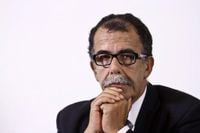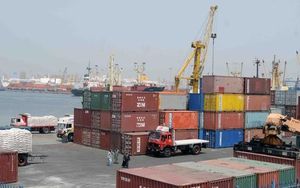Andrea Vianello, a prominent figure in Italian journalism, announced his departure from Rai after 35 years of service. The announcement, made on April 25, 2025, via the social media platform X, marks the end of an era for the journalist who has been a significant part of the public broadcaster's identity.
In his heartfelt message, Vianello stated, "After 35 years of life, news, live broadcasts, programs, emotions, and incredible experiences, I have decided to leave my Rai. It was a consensual agreement. I thank my friends and colleagues; it has been an honor and a magnificent journey. I will always carry with me the sense of public service wherever I go." His words reflect not only his personal sentiments but also a deep appreciation for the role that Rai has played in his career.
Vianello's departure has sparked discussions about the current state of Italian public broadcasting. The Cdr of Tg3 expressed "regret and concern" regarding the circumstances surrounding his exit, suggesting that Vianello was pushed to leave for political reasons. In a statement, the committee noted, "It is yet another high-level colleague who has been sidelined by the company for reasons that we cannot help but define as political, in a gradual emptying of identity and professionalism." This sentiment highlights growing concerns over the direction of Rai and its commitment to maintaining journalistic integrity.
Born in Rome on April 25, 1961, Vianello began his career in journalism after several years of collaboration with newspapers and magazines. He officially joined Rai in 1990 through a competitive examination. His early years saw him working at Gr1 alongside Livio Zanetti and later at Giornale Radio Unificato, where he covered major news events, including the tragic Capaci and Via D'Amelio bombings and the kidnapping of Faruk Kassam.
From 1998 to 2002, Vianello hosted the popular program "Radio anch'io" on Rai Radio 1, gaining recognition for his engaging style and insightful discussions. His transition to television came in 1999 when he debuted with "Tele anch'io" on Rai2. Vianello's influence continued to grow as he became the author and host of the show "Enigma" on Rai3 from 2001 to 2003, and later hosted "Mi manda Rai3" from 2004 to 2010, further solidifying his status as a key figure in Italian media.
In 2012, he was appointed director of Rai3, a position he held until 2016. His leadership during this time was marked by a commitment to quality programming and a focus on public service values. Vianello's career took a personal turn in February 2019 when he suffered a cerebral ischemia, which temporarily affected his ability to speak. He later chronicled this challenging experience in his book "Ogni parola che sapevo," where he detailed his recovery journey.
Following his health scare, Vianello returned to the forefront of Rai's operations, taking on the directorship of Rai News 24 in July 2020, and the following year, he became director of Rai Radio 1 and other related programs. His tenure was marked by a dedication to improving the quality of news coverage and engaging the audience in meaningful ways.
However, in 2023, Vianello's time at Rai took another turn when he was appointed general director of San Marino RTV, a role he resigned from after just ten months. At the time of his departure from Rai, he was reportedly awaiting a new assignment, with discussions about a potential role as director of Radio Tre.
As Vianello steps away from Rai, he leaves behind a legacy of journalistic excellence and a commitment to public service that has resonated with audiences across Italy. His farewell has raised questions about the future of Rai and the challenges it faces in maintaining its identity amidst political pressures and changing media landscapes.
The Cdr's statement reflects a broader concern within the organization regarding the retention of experienced journalists and the potential impact on the quality of public broadcasting. They emphasized the need for Rai to recover its central role in the national information landscape, urging for a focus on internal talent development to combat ideological shifts that may dilute the quality of content offered to the public.
As Vianello embarks on the next chapter of his life, the Italian public will undoubtedly remember him not just for his contributions to journalism but also for his embodiment of the values of public service. His journey through the challenges of the media landscape and personal adversity serves as an inspiring narrative for aspiring journalists and seasoned professionals alike.
In a media environment increasingly influenced by political dynamics, Vianello's departure is a poignant reminder of the importance of integrity and independence in journalism. The hope remains that Rai can navigate these turbulent waters and continue to serve as a beacon of reliable information and cultural enrichment for the citizens of Italy.






